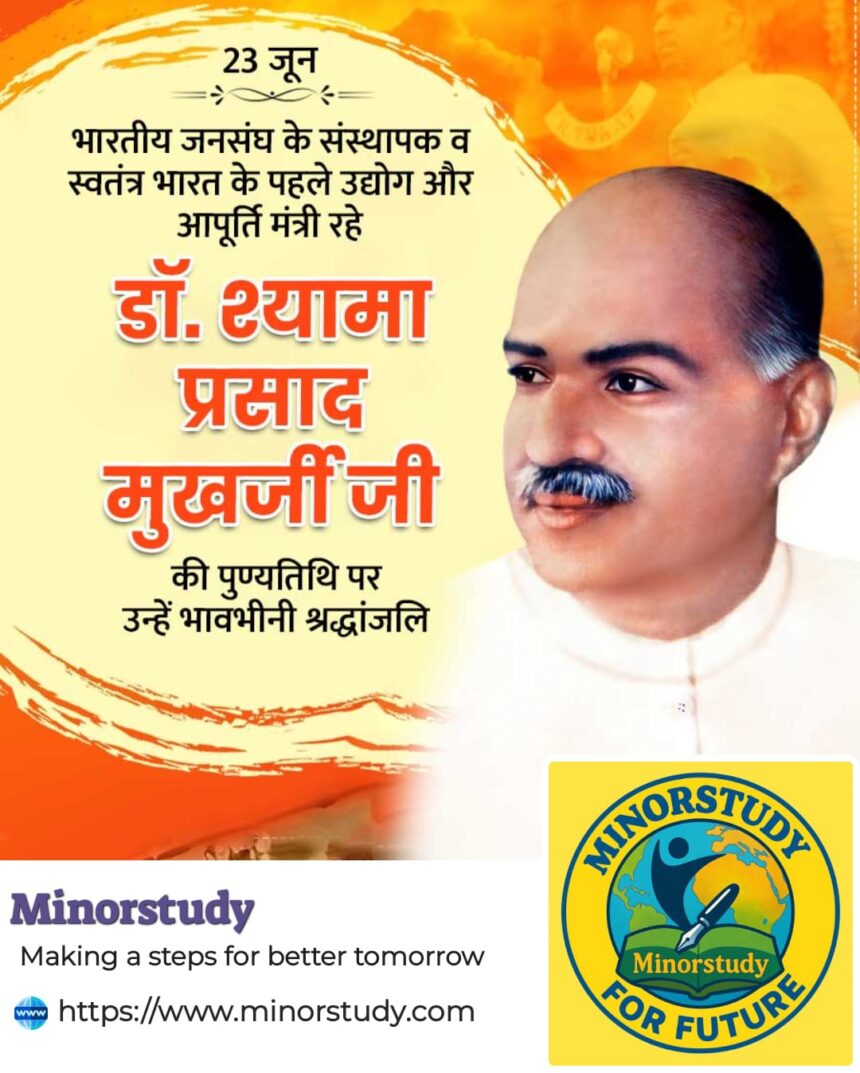7 Inspiring Reasons Dr. Syama Prasad Mukherjee Remains a Positive Force in India
Dr. Syama Prasad Mukherjee (6 July 1901–23 June 1953) was a barrister, educationist, politician, minister, and fierce nationalist, whose legacy continues to influence India’s political landscape, especially through the founding of the Bharatiya Jana Sangh—predecessor to today’s BJP. His rise and untimely death left an indelible mark on national discourse. Let’s explore his life—from early brilliance to enduring societal impact.
- 📜 Early Life & Academic Brilliance
- ⚖️ Political Foundations and Pre-Independence Career
- 🏛️ Post-Independence & National Impact
- 🗓️ Timeline of Key Events
- 📌 Essential Facts
- 🙋 Frequently Asked Questions (FAQs)
- 🌟 Significance in Our Lives
- 🎉 Observance & Wishing
- 🧭 Impact on Daily Life & Society
- 🏁 Conclusion: His Enduring Legacy
📜 Early Life & Academic Brilliance
Born on 6 July 1901 in Calcutta into a prestigious family—his father Ashutosh Mukherjee was a Judge and Vice-Chancellor of Calcutta Universityconstitutionofindia.net+15en.wikipedia.org+15studyiq.com+15.
A top student: secured first-class first in BA (1921) and MA (1923), followed by an LLB (1924), before joining Lincoln’s Inn and being called to the English Bar in 1926en.wikipedia.org+1thefamouspeople.com+1.
At just 33, he became the youngest Vice-Chancellor of Calcutta University (1934–1938), where he championed teaching in vernacular Bengali and hosted Tagore’s famous Bengali convocation addressconstitutionofindia.net+2en.wikipedia.org+2drishtiias.com+2.
⚖️ Political Foundations and Pre-Independence Career
In 1929, he was elected to the Bengal Legislative Council via Congress, then briefly independent, serving until 1947opindia.com+7en.wikipedia.org+7shyamaprasad.org+7.
Became Finance Minister of Bengal (1941–1942) in a coalition government; resigned in protest, advocated for self-rule, and actively combatted the Bengal famineconstitutionofindia.net.
Served as President of the Hindu Mahasabha (1943–1946), opposing both Partition and the Quit India Movementopindia.com+3en.wikipedia.org+3en.dharmapedia.net+3.
🏛️ Post-Independence & National Impact
Joined Nehru’s first cabinet as Minister for Industry & Supply (later Commerce & Industry; 1947–1950), laying the groundwork for industrial boards: All-India Handloom, Silk Board, Textile Research, Industrial Finance Corporationthefamouspeople.com+2en.dharmapedia.net+2opindia.com+2.
Opposed the Nehru–Liaquat Pact (1950), resigned in protest against concessions to Pakistan minorities.
In 1951, founded the Bharatiya Jana Sangh (BJS) with RSS support—ushering in a new force in India’s electoral politics and ideological righten.dharmapedia.net+8en.wikipedia.org+8studyiq.com+8.
🗓️ Timeline of Key Events
| Year | Event |
|---|---|
| 1901 | Birth in Calcutta |
| 1921–23 | BA & MA (first-class, first place) |
| 1926 | Called to English Bar |
| 1929 | Enters Bengal Legislative Council |
| 1934–38 | Vice-Chancellor, Calcutta University |
| 1941–42 | Finance Minister, Bengal |
| 1943–46 | President, Hindu Mahasabha |
| 1947–50 | Industry & Supply Minister, India |
| 1950 | Resigned over Liaquat–Nehru Pact |
| 1951 | Founded Bharatiya Jana Sangh |
| 1953 | Arrested in Kashmir; died June 23 |
📌 Essential Facts
First Industry Minister laid industrial policy foundationsthefamouspeople.com+5en.wikipedia.org+5constitutionofindia.net+5en.wikipedia.org+3shyamaprasad.org+3en.wikipedia.org+3constitutionofindia.net+4thefamouspeople.com+4en.wikipedia.org+4en.wikipedia.org+8studyiq.com+8en.wikipedia.org+8constitutionofindia.net+3en.dharmapedia.net+3en.wikipedia.org+3ijcrt.org+5opindia.com+5constitutionofindia.net+5constitutionofindia.net+1en.dharmapedia.net+1.
Founder of BJS, the ideological precursor to BJPthefamouspeople.com.
Advocate for “One Nation—One Constitution”, fought Article 370constitutionofindia.net+3en.dharmapedia.net+3studyiq.com+3.
Arrested attempting to enter Kashmir without permit; died in detention in 1953studyiq.com+5en.wikipedia.org+5drishtiias.com+5.
Intellectual—wrote Leaves from a Diary, Education in British India, A Phase of the Indian Struggleconstitutionofindia.net.
Champion of vernacular education and cultural nationalismopindia.com+6en.wikipedia.org+6thefamouspeople.com+6.
🙋 Frequently Asked Questions (FAQs)
Q1: Why does the BJP see him as a founding father?
The Bharatiya Jana Sangh, founded by Mukherjee in 1951, evolved into the BJP through alliances and reorganization, embedding his ideological foundationsconstitutionofindia.net+6ijcrt.org+6en.wikipedia.org+6.
Q2: What was his contribution as Industry Minister?
He created key industrial frameworks—All-India Handloom Board, Silk Board, Khadi & Village Industries Board, and more—setting India on a path to self-relianceopindia.com.
Q3: Why did he die in 1953?
Detained in Jammu & Kashmir for defying the permit rule, he died under ambiguous circumstances, reportedly from a heart attack, provoking suspicion of foul play.
Q4: What was his stance on Kashmir?
He vehemently opposed Article 370’s special status, demanding Kashmir integration under “One Nation, One Constitution”constitutionofindia.net+2en.dharmapedia.net+2studyiq.com+2.
Q5: What legacy does Mukherjee leave today?
Remembered as an educationist, nationalist, constitution protector, his life remains a source of inspiration—especially among those who value national unity and ideological clarity.
🌟 Significance in Our Lives
As a visionary who believed in vernacular culture, national unity, and political activism through conviction.
As a policy-maker who laid foundations for India’s industrial and handicraft sectors.
As a freedom fighter actively opposing Partition and advocating for refugees.
As an educator who promoted Indian languages and youth development.
🎉 Observance & Wishing
Dr. Mukherjee’s memory is honored on 6 July (birth anniversary) and 23 June (death anniversary). Wishes include:
🕊 “Remembering Dr. Syama Prasad Mukherjee—a man whose intellect, conviction, and patriotism continue to inspire.”
🕊 “On this day, let us reflect upon his courage in fighting for national unity and educational empowerment.”
🕊 “Honoring the legacy of a true nation-builder—may his dedication continue to guide us.”
🧭 Impact on Daily Life & Society
Dr. Mukherjee’s influence permeates modern society:
Educational values—promoting vernacular learning and academic excellence.
Industrial groundwork—helping shape self-reliant India’s economy.
Cultural nationalism—inspiring pride rooted in unity and constitutional ideals.
Political activism—motivating citizens to stand for principles beyond party lines.
🏁 Conclusion: His Enduring Legacy
Dr. Syama Prasad Mukherjee’s life was a tapestry of intellect, conviction, and sacrifice. From Vice-Chancellor to Minister, from founder of BJS to his tragic death in Kashmir, he symbolized India’s journey towards unity, self-reliance, and cultural identity.
His legacy offers powerful lessons:
Education is the bedrock of society.
Principles matter—stand firm, even against political tides.
National unity under one constitution is non-negotiable.
Public service must serve the people first.
As our nation continues to evolve, remembering Dr. Mukherjee reminds us that true leadership blends vision, values, and courage—qualities that remain as vital today as they were in his time.








